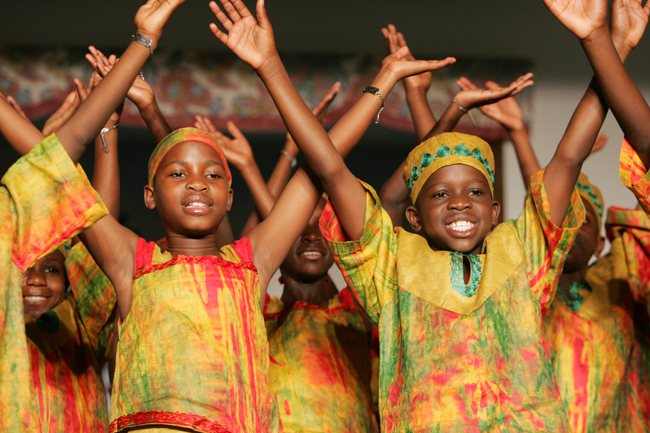African Children’s Choir sing to better their homeland
In a midst of multiple genocides and civil wars in Africa, the African Children’s Choir made a stop Tuesday at Cache Valley Ellen Eccles Theatre on their “journey of hope” to raise money and make Africa a better place.
Journey of Hope is the tour of African Children’s Choir, a daughter organization of the Music for Life Institute, a humanitarian relief and development organization dedicated to the survival, education and well-being of Africa’s children.
“Civil war, genocide, poverty and corruption have needlessly turned tens of thousands of children in Africa into orphans,” said Ray Barnett, president of Music for Life organization. “Children should never have to face these atrocities but they can be pulled from these ashes to become the solution for a better Africa.”
Twenty-five different choirs made of “the neediest and most vulnerable children in Africa” have toured to different countries to present African culture to the world and raise money to improve the lives of their fellows since 1984, Barnett said. According to Music for Life’s Web site, more than 30 schools and 7,000 children in Africa are now supported due to the benefits of African Children’s Choir.
Africa has a literacy rate of less than 60 percent. The fundamentals of the Music for Life are based on the belief that providing children at risk with education and hope today, the global village can help advance Africa tomorrow. The organization makes sure the members of the choir attain education after returning home, according to the Music for Life Web site.
“I never knew my father,” said Victor, a Ugandan former choir member. “My mother could not afford taking care of me and she had to take me to an orphanage. I was blessed to be chosen to join African Children’s Choir. I was once one of the most vulnerable children in Africa. Now I have a college degree in social sciences and development.”
Children are recruited every year. Most of them don’t have one or both parents. Going to school is a luxury for them.
“When I was 8, I had malaria,” said Proscovia, former choir member and Music for Life volunteer. “I was living with my grandmother because my mother couldn’t afford taking care of me. My grandmother had to take me to a city and leave me at a hospital.”
Three years after Proscovia survived malaria she was chosen to be a member of the 13th choir.
“I had to walk barefoot to school every morning,” Proscovia said. “The school was six miles away. Sometimes it rained. Sometimes it didn’t. But I knew it was worth it. I wanted to get education.”
Proscovia recalls her first visit to the United States as a choir member.
“I thought I was going to die,” she said. “At home we are told that ghosts are white and they have long hair. When I saw all these girls with long hair, I thought that the ghosts had surrounded us.”
A former choir member named Ben recalls his story.
“I thought we are going to America through water. I didn’t know how to swim and I was scared. I talked to one of the volunteers. She said we were going by plane,” he said. “I relaxed.”
With four out of 10 children illiterate in Africa, the continent is doing better than in previous decades. Started as a one-time project, African Children’s Choir continues to raise money to drop illiteracy rates as stated on the official Web site of the organization.
“We have come a long way,” Barnett said. “We still have a long way to go. We’ve always believed that mountains can be moved one child at a time. These children represent the beauty and dignity of Africa and hold the key to Africa’s future.”
–satenik.sargsyan@aggiemail.usu.edu

